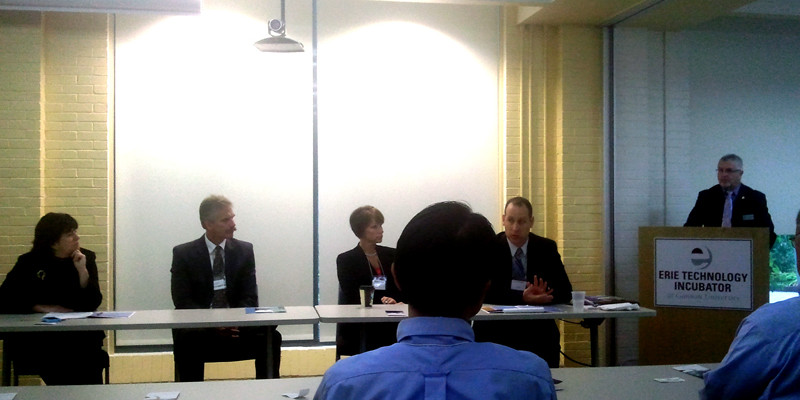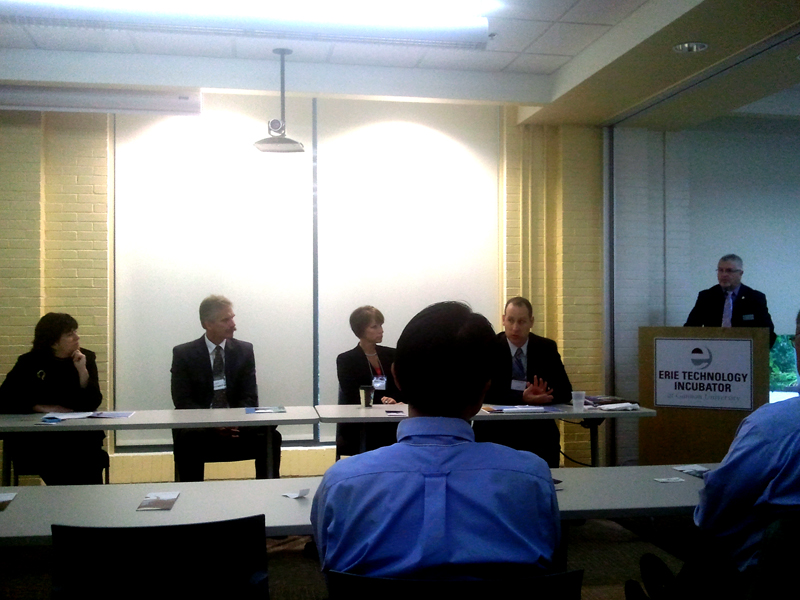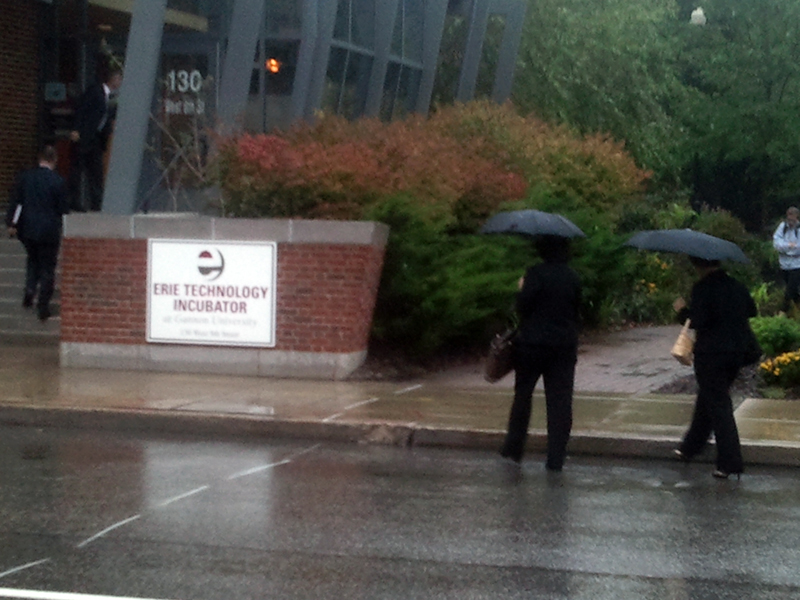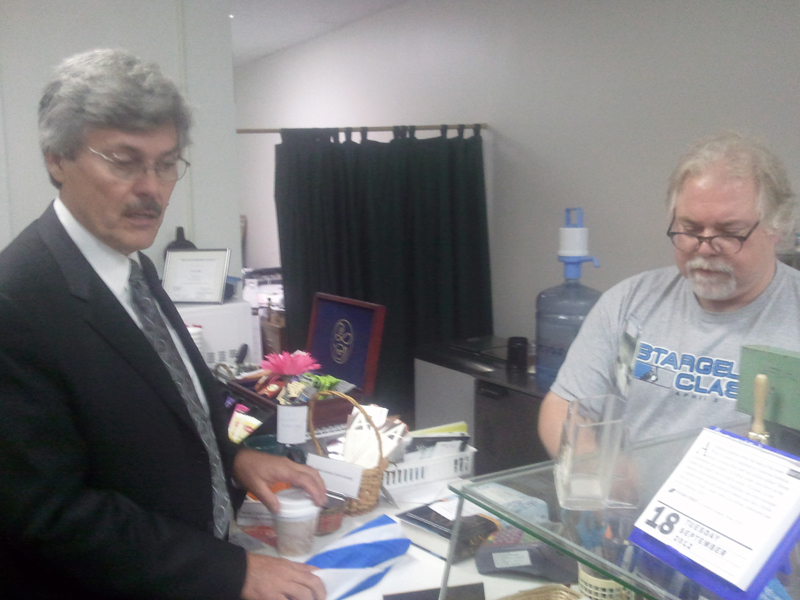We had the good fortune of taking the scenic route to Erie from our lunchtime stop in Meadville at the historic Market House on Monday, the first day of our seven-hour, cross-state trip to Northwest Pennsylvania.
Traveling north on Route 19, we got a sneak peek at some fall foliage in Erie County as we weaved through Waterford. Once we got near the crest of a hill just inside Erie city limits, you could see the horizon of Lake Erie, a majestic and rare vantage point for any city.
The Flagship City presented plenty of opportunities to see a city in transition, as we took part in the state Department of Community and Economic Development’s On the Road tour, which featured stops at many innovative and successful operations throughout Erie and the surrounding county.
That’s why it was surprising to hear the local buzz and read the corresponding headlines when we arrived, that Erie County had been designated a “rural” location by the Pennsylvania Department of Welfare as part of a reclassification process that changed several counties' designation and took effect July 1. The new label is significant in that it will reduce funding for services for the region's most vulnerable citizens — the physically and mentally disabled — by 13 percent. Perhaps most frustrating to locals is that indeed, they live in a city that is chugging along the economic comeback trail with some very real assets. As noted in the Erie Times-News:
“Erie is a Great Lakes port with four universities, a medical school, destination-point hospitals, the largest locomotive plant in the world and largest insurance headquarters in the state.”
These are certainly the attributes of an urban center — one that, like many mid-sized cities across Pennsylvania, holds many telltale signs of urban struggle and renewal.
In the heart of State and Peach Streets, there are dozens of offices offering a variety of services to those with mental illness, struggling with addiction, or receiving benefits. Many folks who receive these services can be seen lining up or waiting around these offices. There is also an abundance of Section 8 housing in downtown Erie, something highlighted in the Downtown Erie Housing Survey portion of the Market Analysis for Downtown Erie report, issued by Philadelphia-based community and economic development firm Urban Partners in April.
There's help on the way for some of those downtown struggles, even if it's not coming from the state's department of welfare. We talked with Perry Wood, one of Erie's bright young leaders who is taking a leadership role in improving the city and surrounds beyond his day job as executive director of the Erie County Gaming Revenue Authority. His organization is the only one of its kind in the state, adding purpose and accountability to the distribution of revenue from gambling.
In the last fiscal year, the ECGA issued more than $10.5 million in grants according to its annual report. More than half went toward establishing the Erie County Lead Asset Endowment, which aims to provide 5 percent of funded organizations' operating budgets on an annual basis, helping stabilize nonprofit organizations like the Erie Philharmonic, the expERIEnce Children's Museum and the Mary D'Angelo Performing Arts Center. Immediate, service-based needs were met through $100,000 in funds to 11 social service agencies that made possible school bus repairs, halfway house and veterans housing renovations, and expanded outreach for Meals on Wheels.
Wood is also a part of Destination Erie, a regional plan for sustainable development that happens once every 50 years (just like in Philadelphia) that aims to enhance economic development and competitiveness, reduce poverty through effective workforce education and job creation, support existing communities, improve transportation and infrastructure systems and engage our community and build partnerships for action.
One example that was on full display this week was Erie's historic Little Italy, a culturally diverse neighborhood with many assets and resources that has been designated DCED’s first designated Keystone Elm Street community. The biggest target will be vacant and abandoned homes, and tax credits will help the Sisters of Saint Joseph Neighborhood Network improve the community’s appearance, expand economic development options, fund façade improvements for businesses, remove blight and perform streetlight and sidewalk repair.
“Communities that are able to secure private sector support by forging public-private partnerships will achieve long-term success,” says DCED Secretary Alan Walker.
On Tuesday, Keystone Edge publisher Greg O'Loughlin and I got to see the Erie Technology Incubator, which hosted entrepreneurs from across the region, among others, for a Q&A session with DCED representatives. Sherri Collins, DCED's executive director of technology investment, set the tone for the agency's new focus on “customer” service. She was happy to share that she recently used a locally made product, Erie-based Trick Shot lubricant, to fix her husband's chair. While DCED can't purchase and use every PA-made product, it will soon have business marketing representatives fielding phone inquiries from Pennsylvania entrepreneurs looking for resources like financing. DCED's updated approach was on display at Cross Creek Resort & Conference Center in Titusville, where DCED reps greeted attendees to a networking breakfast for rural Northwest PA economic development pros.
Keystone Edge hosted “Coffee On the Edge” at the expanded Erie Book Store on the 900 block of State Street. Erie native Eric Turkowski took over the business last year and added a modest coffee shop that is fronted by leftover artwork on the street from last month's Chalk Walk event. Turowski admits business has been slow but is clearly intent on keeping an independent book and coffee shop in downtown Erie.
And people do come downtown for more than services. They throw block parties in Erie (just like in Philadelphia), and they pack the streets at spots from Jerry Uht Park to Union Station.
We saw plenty of other signs of an urban center. The Bayfront Convention Center is beautiful and massive. There is plentiful nightlife and a growing beer scene that's catching up with the established wine community. There’s a highly successful tourism sector.
The recent rural designation is unfortunate and seems unfair. It also seeems unlikely to change. The silver lining this week is that there are plenty of people on the ground working on securing Erie's future for its brightest and most vulnerable residents, and we'll continue to tell their stories.
Erie may not have deserved the rural designation. But it deserves everything that helps make our state's great cities among the most innovative in the nation.
JOE PETRUCCI is managing editor of Keystone Edge. Send feedback here.




